As mentioned in the post about the BBC’s lie that the ‘best scientific experts’ made up the external attendees at its 2006 Climate Change seminar, the film maker John Bridcut was the author of a report for the BBC Trust about ‘safeguarding impartiality in the 21st century’ in which it was written:
The BBC has held a high-level seminar with some of the best scientific experts, and has come to the view that the weight of evidence no longer justifies equal space being given to the opponents of the consensus [on anthropogenic climate change].
On his website Bridcut states that he wrote the ‘From Seesaw to Wagon Wheel‘ report with the help of ‘a steering group from inside and outside the BBC’. Having presented as fact something that has now been shown to be patently false, AM contacted Mr Bridcut to ask him if he wished to comment on the fresh information and if he would say who told him the seminar comprised a group of ‘best scientific experts’. The email trail is below:
—————————–
Dear Mr Bridcut
You will no doubt be familiar with the following words taken from the above named report:
“The BBC has held a high-level seminar with some of the best scientific experts, and has come to the view that the weight of evidence no longer justifies equal space being given to the opponents of the consensus [on anthropogenic climate change].”
Information subsequently found in the public domain regarding the attendees at that seminar, and currently being discussed on social media and in the press, reveals your assertion to be inaccurate. There is a suspicion that your assertion stemmed from information you were provided with about the seminar when compiling your report. Would you care to comment on this, perhaps outlining where information colouring the assertion you made regarding the ‘best scientific experts’ originated? I feel it is only proper that you have the opportunity to clarify this matter and ensure the record is correct.
I look forward to your early reply.
Yours sincerely
———————–
Dear Mr Nightingale,
Thank you for your message. When you say that my assertion is revealed to be inaccurate, to which words are you specifically referring? For your ease of reference, I append the whole paragraph from the report, rather than the single sentence you have highlighted.
“The BBC has held a high-level seminar with some of the best scientific experts, and has come to the view that the weight of evidence no longer justifies equal space being given to the opponents of the consensus. But these dissenters (or even sceptics) will still be heard, as they should, because it is not the BBC’s role to close down this debate. They cannot be simply dismissed as ‘flat-earthers’ or ‘deniers’, who ‘should not be given a platform’ by the BBC. Impartiality always requires a breadth of view: for as long as minority opinions are coherently and honestly expressed, the BBC must give them appropriate space. ‘Bias by elimination’ is even more offensive today than it was in 1926. The BBC has many public purposes of both ambition and merit – but joining campaigns to save the planet is not one of them. The BBC’s best contribution is to increase public awareness of the issues and possible solutions through impartial and accurate programming. Acceptance of a basic scientific consensus only sharpens the need for hawk-eyed scrutiny of the arguments surrounding both causation and solution. It remains important that programme-makers relish the full range of debate that such a central and absorbing subject offers, scientifically, politically and ethically, and avoid being misrepresented as standard-bearers. The wagon wheel remains a model shape. But the trundle of the bandwagon is not a model sound.”
Best wishes
John Bridcut
———————–
Dear Mr Bridcut
The words to which I specifically refer are:
“The BBC has held a high-level seminar with some of the best scientific experts…”
The reason for this is the attendee list of the seminar you refer to, which the BBC has fought an expensive legal action to withhold from the public, has been found in the public domain and is currently forming the basis of stories in various media. Of the 28 external attendees, i.e. non BBC staff, only three were scientists and none of those were specialists in climate change disciplines. The rest of the 28 attendees were environmental campaigners from pressure groups, charity representatives, a staffer from the US Embassy, students, someone from the Church of England, an insurance industry consultant, and even a representative from the CBI.
Perhaps you will agree this puts the seminar in a completely different light to that presented in your report. Many are arguing the assertion in your report misrepresents the facts. That is the reason for me contacting you and inviting you to comment and outline the origin of the information you asserted in your report.
Best wishes
———————–
Dear Mr Nightingale
Thank you for your further communication. I was not privy to any specific information about the guest-list at the seminar, but I am baffled by the attention you are devoting to that clause, since it seems to me it contains the least important words in the paragraph. The point, surely, is what the BBC’s conclusion was after the seminar, however constituted, and then my report’s words of admonition (from the second sentence through to the end of the paragraph) – words with which, from the tone of your message, I would have thought you found some agreement. To concentrate on the constitution of the seminar is to miss the point of this section of the report entirely.
Best wishes
John Bridcut
———————–
Dear Mr Bridcut
Thank you for your reply. I think you may be missing the significance that has been attributed by the BBC to the claim the seminar consisted of “some of the best scientific experts”, the point you make in your report.
As Andrew Orlowski points out, the outputs of the seminar resulted in the BBC abandoning balance and impartiality in its coverage on a topic for the first time since World War II. Even in its reporting of the conflict between this country, the Empire and allies with Nazi Germany, the BBC remained impartial. However on the subject of AGW the BBC has cited as the justification for its editorial position the advice received from “scientific experts” at this seminar, a group it now transpires was actually made up of NGOs, activists and campaigners with not a single climate specialist in the room.
I argue that although it is a clear misrepresentation it is something you have retailed as fact in your report. I would suggest in the light of this your assertion being factually incorrect, irrespective of the comments you follow it with, has implications for your credibility possibly through no fault of your own. That is why I am attempting to identify the source of the information you used that lead you to make an assertion that had no basis in fact.
I hope this clarifies the rationale for the strict focus within your text.
Best wishes
———————–
Dear Mr Nightingale
I am afraid I cannot now recall the origin of that phrase, and you are the first person to have raised it with me. But if you wish to take issue with the report, I suggest you take up the matter with the BBC Trust.
Best wishes
John Bridcut
———————–
———————–
It seems incuriosity is something that permeates the BBC and those it commissions to do its bidding, and when pressed people seem to develop short memories about significant details they use to bolster their work but which are later found to be without foundation. Sadly Bridcut doesn’t seem bothered he was given false information and seems happy for it to stand in the public record. This is very telling in itself. It’s clearly OK to witter on about impartiality, but truth and accuracy are dispensible perspectives.
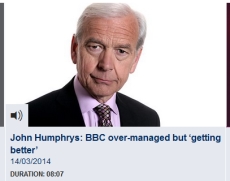 The BBC has begun its effort to sanitise, downplay and distort the comments by Radio 4 presenter, John Humphrys, in the Radio Times in which he said that BBC coverage of EU and immigration matters has been biased to the left because the corporation is ‘broadly liberal’.
The BBC has begun its effort to sanitise, downplay and distort the comments by Radio 4 presenter, John Humphrys, in the Radio Times in which he said that BBC coverage of EU and immigration matters has been biased to the left because the corporation is ‘broadly liberal’.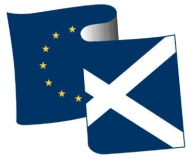 For some people this may be a statement of the bleeding obvious, but listening to BBC Radio 4 Today this morning, it seems the media is using the Scottish independence campaign to test out which arguments should be made and lines taken in any future EU referendum campaign (whenever that might be).
For some people this may be a statement of the bleeding obvious, but listening to BBC Radio 4 Today this morning, it seems the media is using the Scottish independence campaign to test out which arguments should be made and lines taken in any future EU referendum campaign (whenever that might be).
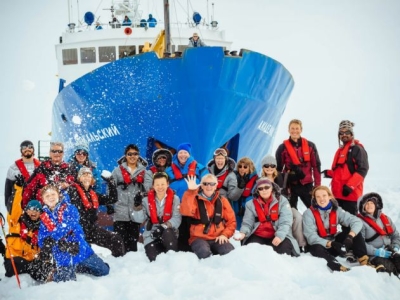
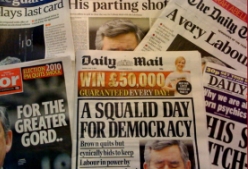

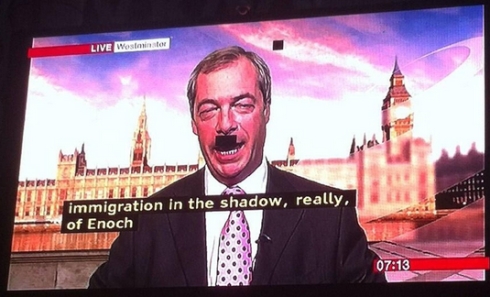
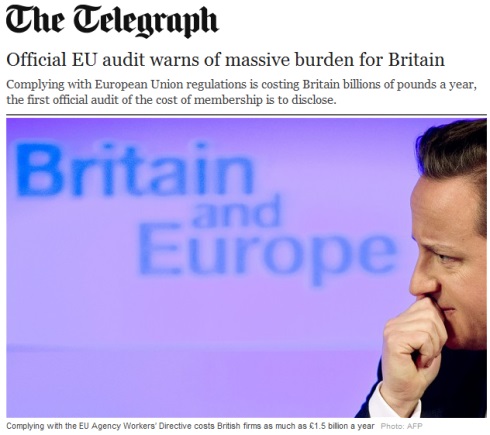
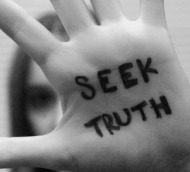
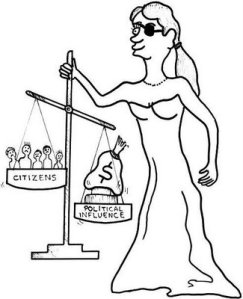
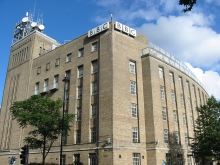
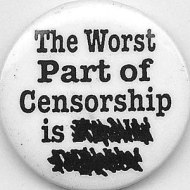
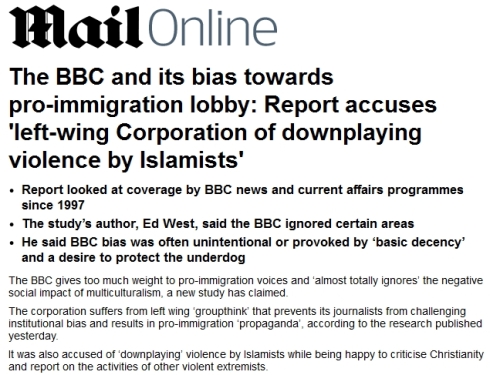

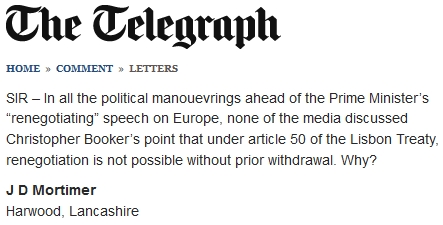
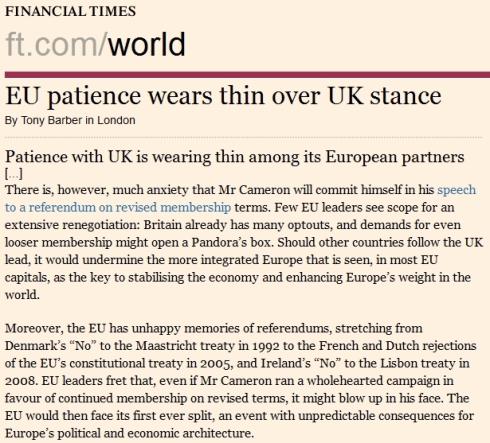
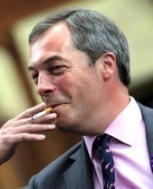
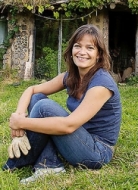
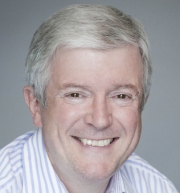









What’s on your Mind?